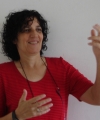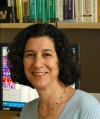|
Conference Chairs
Olga Troyanskaya, Conference Chair, Princeton University, New Jersey, USA
Michal Linial, Conference Co-chair, The Hebrew University of Jerusalem, Jerusalem, Israel Jill Mesirov, Conference Co-Chair, Broad Institute of MIT and Harvard, Cambridge, USA  Olga Troyanskaya is an Associate Professor in the Department of Computer Science and the Lewis-Sigler Institute for Integrative Genomics at Princeton University, USA, where she runs the Laboratory of Bioinformatics and Functional Genomics. Her work bridges computer science and molecular biology in an effort to develop better methods for analysis of diverse genomic data with the goal of understanding and modeling protein function and interactions in biological pathways. Her group includes theoretical and experimental aspects, and tackles diverse questions including developing integrative technologies for pathway prediction, study of biological networks and functional evolution, and investigation of natural tumor development. Dr. Troyanskaya is an Associate Editor for Bioinformatics, PLOS Computational Biology, and editorial board member of Journal of Biomedical Informatics, Briefings in Bioinformatics, and Biology Direct. She is also a member of the Board of Directors of the International Society for Computational Biology. She received her Ph.D. from Stanford University and is a recipient of the Sloan Research Fellowship, the NSF CAREER award, and the Howard Wentz faculty award. She has also been honored as one of the top young technology innovators by the MIT Technology Review. Olga Troyanskaya is an Associate Professor in the Department of Computer Science and the Lewis-Sigler Institute for Integrative Genomics at Princeton University, USA, where she runs the Laboratory of Bioinformatics and Functional Genomics. Her work bridges computer science and molecular biology in an effort to develop better methods for analysis of diverse genomic data with the goal of understanding and modeling protein function and interactions in biological pathways. Her group includes theoretical and experimental aspects, and tackles diverse questions including developing integrative technologies for pathway prediction, study of biological networks and functional evolution, and investigation of natural tumor development. Dr. Troyanskaya is an Associate Editor for Bioinformatics, PLOS Computational Biology, and editorial board member of Journal of Biomedical Informatics, Briefings in Bioinformatics, and Biology Direct. She is also a member of the Board of Directors of the International Society for Computational Biology. She received her Ph.D. from Stanford University and is a recipient of the Sloan Research Fellowship, the NSF CAREER award, and the Howard Wentz faculty award. She has also been honored as one of the top young technology innovators by the MIT Technology Review.Top  Michal Linial is a Professor of Biochemistry, Molecular Biology and Bioinformatics at the Hebrew University of Jerusalem, Israel, where she heads The Sudarsky Center for Computational Biology. She is a founder (1999) and the chair of the undergraduate and graduate joint programs in Computer science and Life Science at the Hebrew University. Michal Linial is a Professor of Biochemistry, Molecular Biology and Bioinformatics at the Hebrew University of Jerusalem, Israel, where she heads The Sudarsky Center for Computational Biology. She is a founder (1999) and the chair of the undergraduate and graduate joint programs in Computer science and Life Science at the Hebrew University.She received her PhD from the Hebrew University's Medical School (1986) in Biochemistry and Molecular Biology. During her post-doctoral training in Stanford University, she engaged in molecular neuroscience with the goal of deciphering the molecular makeup of the synapse. She joined the Hebrew University (1989) and was a driving force in merging computational and analytical tools with classical wet biology. Her laboratory is active in the two arenas - She leads a wet lab as well as a computational group. Her research interests span a broad range of topics such as stem cells, neuronal differentiation, synapse regulation, cell biology of secretory systems and the molecular mechanisms that underlie behavior. With the maturation of large-scale technologies, she has become involved in developing methods for target selection in Structural Genomics, protein family classification and the development of methodologies for the analysis of large-scale biological data sets. She is particularly interested in introducing powerful computational tools to meet the needs of the biological and bio-medical research communities. Among the web tools developed by her research group are PANDORA, ProtoNet, and EVEREST. One of her main recent areas of activity is proteomics where she combines experimental, technological and computational work. She is the current Chair of the European Conference in Computational Biology, and a member of the steering committee of RECOMB. She is a member of ISCB's Board of directors, and is active in the Conference and Education committees and a liaison to the ISCB Student councils. Top  Jill Mesirov is chief informatics officer of the Broad Institute of MIT and Harvard where she directs the Computational Biology and Bioinformatics Organization. She is also a member of the MIT Center for Cancer Research and adjunct professor of bioinformatics at Boston University. Jill Mesirov is chief informatics officer of the Broad Institute of MIT and Harvard where she directs the Computational Biology and Bioinformatics Organization. She is also a member of the MIT Center for Cancer Research and adjunct professor of bioinformatics at Boston University.
Dr. Mesirov is a computational scientist who has spent many years working in the area of high-performance computing on problems that arise in science, engineering and business applications. Her current research interest is computational biology with a focus on algorithms and analytic methodologies for pattern recognition and discovery with applications to cancer genomics, genome analysis and interpretation, and comparative genomics. In addition, Mesirov is committed to the development of practical, accessible software tools to bring these methods to the general biomedical research community.
In 1997, Dr. Mesirov came to the Whitehead Institute/MIT Center for Genome Research, now part of the Broad Institute, from IBM, where she was manager of computational biology and bioinformatics in the Healthcare/Pharmaceutical Solutions Organization. Before joining IBM in 1995, she was director of research at Thinking Machines Corporation for 10 years. She has also held positions in the mathematics department at the University of California at Berkeley, the Institute for Defense Analyses' Center for Communications Research in Princeton, and as associate executive director of the American Mathematical Society.
Top |